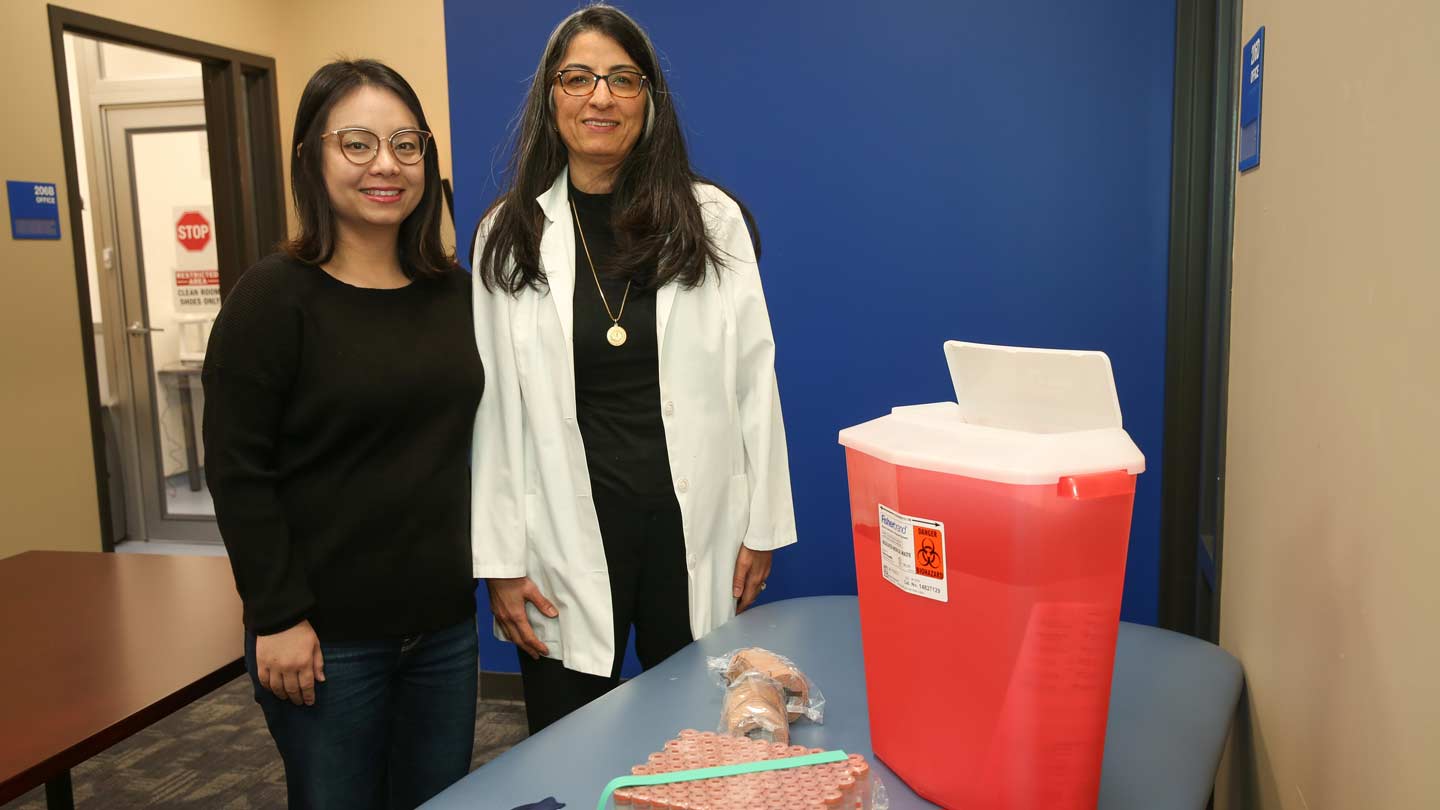
Dr. Shuang Zhao, left, and Dr. Azita Amiri are teaming to study how socioeconomic and environmental factors could affect a child’s developing immune system.
Michael Mercier | UAH
Two professors at The University of Alabama in Huntsville (UAH) have teamed up with a genetic sequencing firm at the HudsonAlpha Institute for Biotechnology to try to understand whether the socioeconomic status of parents and environmental exposures have an impact on the developing immune systems of their children.
Principal investigator Dr. Shuang Zhao, an assistant professor jointly appointed to the Department of Political Science and the Department of Atmospheric Science, is teaming with co-principal investigator Dr. Azita Amiri, an assistant professor in the College of Nursing, for the research. Currently in the initial stages, the research is being funded by iRepertoire Inc., a genetic sequencing company.
"Because of children’s vulnerability to environmental risks, children’s health and how the environment impacts them is a top priority for both Dr. Amiri and myself," says Dr. Zhao. "In this study, we aim to identify the body’s immunological memory or ‘logbook’ of all past infection and disease in children from birth to age 18 by using immune repertoire sequencing technology provided by the company iRepertoire."
From a population of 100 North Alabama parents and their children, the researchers will examine whether parental factors including income, lifestyle choices and the parents’ knowledge about the indoor environment are associated with the immune system T-cell and B-cell diversity of their children.
Parents will complete questionnaires about their demographic and socioeconomic background, as well as indoor environmental exposures, that later could correlate with their children’s immune system. Their healthy children will provide blood samples.
"As a nurse scientist and a maternal and child health specialist, I want to know what is happening in our immune repertoire in case of exposure to different environmental hazards and how we can boost the good part of the immune repertoire and change the bad part," says Dr. Amiri, who serves as co-chair of the Alliance of Nurses for Healthy Environments (ANHE) and chair of the environmental task force of the Alabama State Nurse Association (ASNA).
"The data on the children’s immune systems will also contribute to building a database on the diversity of the human immune system," Dr. Zhao says. "Our research results will provide important evidence for family and health professionals’ decision-making when dealing with children’s health."
iRepertoire will perform the immune repertoire sequencing from blood samples using Next Generation Sequencing and will be responsible for the analysis and interpretation of the immune system database.
"Immune repertoire sequencing is a new and advanced technology to provide a map of the diversity of a person’s immune repertoire. However, we don’t yet have a dataset to interpret how diversity in the body’s immune repertoire combats different diseases," Dr. Zhao says.
Sequencing the immune repertoire will potentially yield insights into the nature of the body’s immune response to disease and infection, she says.
"Our data joining other data from different age groups over time will help to contribute to basic scientific research in the development of the human immune repertoire, which eventually will help with the diagnosis and treatment of diseases, vaccine studies and looking for biomarkers for diseases."
Data analysis and published results are expected in the year 2021.
"We intend to apply for federal funding to make this study a longitudinal study, where we could follow up participants and monitor their immune system development for several years," Dr. Zhao says.
The researchers’ major work focuses on communities that are disproportionally exposed to more environmental harms by evaluating the amount of pollution they are exposed to and how their health is affected, Dr. Zhou says. The resulting data can aid and educate communities about how to mitigate environmental risks.
"My training is mostly in policy and quantitative analysis while Dr. Amiri has significant experience in nursing and environmental health," Dr. Zhao says. "While Dr. Amiri could provide health outcome analysis for environmental policies I often evaluate and analyze, I could identify policy implications and remedies for environmental health problems often found in her research."
How to participate
Parents interested in participating should look for fliers that will appear on the study’s Facebook page and at public libraries and universities and colleges in Huntsville, Madison and Decatur. Participation is free. After their child’s blood is analyzed, parents will be provided a visual snapshot of a sample of their child’s immune system with a color-coded tree map. Participants will be shown how to read the map and informed about the immune diversity of their child or children.
There are no particular gender or racial/ethnic and economic requirements for participants.